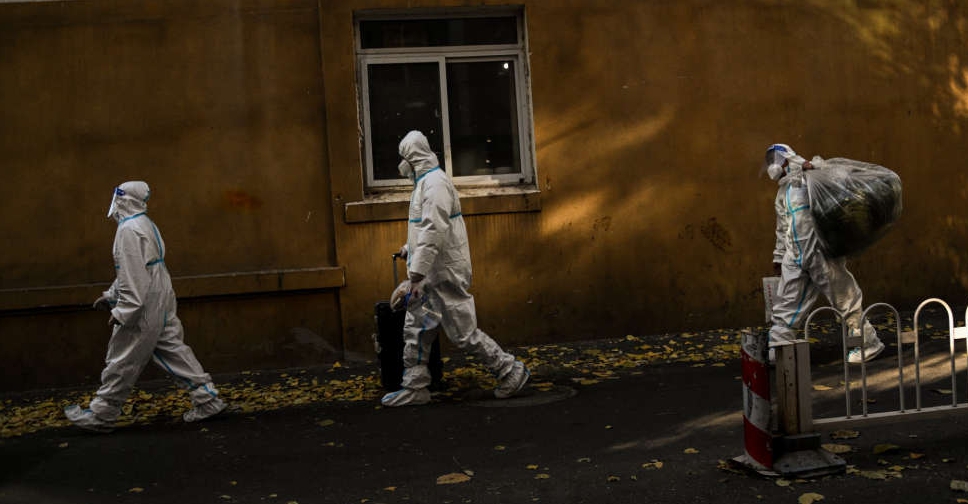
Streets in major Chinese cities were eerily quiet on Sunday as people stayed home to protect themselves from a surge in COVID-19 cases that has hit urban centers from north to south
China is in the first of an expected three waves of COVID cases this winter, according to the country's chief epidemiologist, Wu Zunyou. Further waves will come as people follow the tradition of returning en masse to their home areas for the Lunar New Year holiday next month, he said.
China has not reported any COVID deaths since Dec. 7, when it abruptly ended most restrictions key to a zero-COVID tolerance policy following unprecedented public protests. The strategy had been championed by President Xi Jinping.
As part of the easing of the zero-COVID curbs, mass testing for the virus has ended, casting doubt on whether official case numbers can capture the full scale of the outbreak. China reported some 2,097 new symptomatic COVID infections on Dec. 17.
In Beijing, the spread of the highly transmissible Omicron variant has already hit services from catering to parcel deliveries. Funeral homes and crematoriums across the city of 22 million are also struggling to keep up with demand amid staff shortages as workers and drivers call in sick.
At Beijing's largest funeral parlour in Babaoshan, also known for handling the bodies of top Chinese officials and leaders, several hearses a minute could be seen entering on Sunday, while the parking area for private cars was also full.
"Right now it is difficult to book a hearse so many relatives transport the body with their own vehicles," said an employee on condition of anonymity.
Smoke billowed out of crematoriums, where groups of people were gathered to collect the ashes of the deceased. It was not immediately clear to what extent a rise in COVID-related deaths was responsible.
Social media posts also showed empty subways in the city of Xian in China's northwest, while in Shanghai, the country's commercial hub, there was none of the usual bustle in the run up to the New Year.
"Festive vibes are missing," said a resident who gave her name as Alice.
In Chengdu, streets were deserted but food delivery times were improving, said a resident surnamed Zhang, after services began to adapt to the recent surge in cases.
Getting hold of antigen test kits was still difficult however, she said, explaining that she had been told the kits she ordered recently had been diverted to hospitals.
'1 PEAK, 3 WAVES, 3 MONTHS'
In Shanghai, authorities said schools should move most classes online from Monday, and in nearby Hangzhou most school grades were encouraged to finish the winter semester early.
In Guangzhou, those already doing online class as well as pre-schoolers should not prepare for a return to school, said the education bureau.
Speaking at a conference in Beijing on Saturday, chief epidemiologist Wu of the Chinese Center for Disease Control and Prevention said the current outbreak would peak this winter and run in three waves for about three months, according to a state media report of his speech.
The first wave would run from mid-December through mid-January, largely in cities, before a second wave would start from late January to mid-February next year, triggered by the movement of people ahead of the week-long New Year holiday.
China will celebrate Lunar New Year starting on Jan. 21. The holiday normally sees hundreds of millions of people travelling home to spend time with family.
A third wave of cases would run from late February to mid-March as people returned to work after the holiday, Wu said.
In eastern Zhejiang province, home to many high-tech companies and industry, the first wave is expected to peak around mid-January, though it could be earlier, health officials told a press briefing on Sunday.
"This period coincides with the Lunar New Year, and population movement will speed up the spread of the epidemic," said Chen Zhong, executive deputy director of the provincial epidemic control taskforce.
A U.S.-based research institute said this week that the country could see an explosion of cases and over a million people in China could die of COVID in 2023.
Wu said severe cases had declined compared with past years and vaccination had offered a certain degree of protection. The vulnerable should be protected, he said, while recommending booster vaccines for the general public.
While China rolled out its first COVID vaccines in 2021, vaccination rates among people aged 60 and above have remained little changed since the summer, according to official figures.
Only 66.4% of people over the age of 80 have completed a full course of vaccination, official news agency Xinhua reported.




 Israeli attacks on Gaza killed 60 people in 24 hours
Israeli attacks on Gaza killed 60 people in 24 hours
 Trump fires National Security Agency director
Trump fires National Security Agency director
 Israel steps up Syria strikes, says Turkey aims for 'protectorate'
Israel steps up Syria strikes, says Turkey aims for 'protectorate'
 US sending Israel 20,000 assault rifles that Biden delayed
US sending Israel 20,000 assault rifles that Biden delayed



